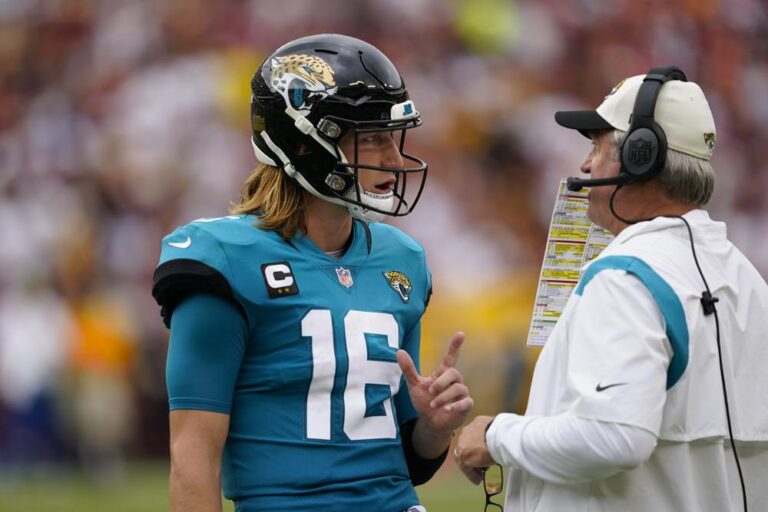
JACKSONVILLE, Fla. (AP) — The Jaguars and the city of Jacksonville have agreed to a $1.4 billion “stadium of the future” that would keep the franchise in one of the NFL’s smallest markets for another 30 years.
The proposal calls for each side to contribute $625 million to the $1.25 billion project. Jacksonville, which won’t levy any new taxes to pay for the rebuild, would chip in another $150 million to get EverBank Stadium ready for construction in 2026.
The plan was presented at a city council meeting Tuesday. Councilmembers are expected to vote on it in late June, with a simple majority of the 19 members needed to pass. It would then advance to the NFL owners meeting in October, where 24 of 32 votes would be needed for final approval.
“We wouldn’t be proposing it or pushing it if we didn’t have a certain level of confidence that this deal would be approved,” Jaguars team president Mark Lamping said.
Construction would begin following the 2025 season. The Jaguars would play in front of a reduced capacity in 2026 and host home games in either Gainesville or Orlando the following year. Daytona Beach International Speedway had been under consideration but has since been eliminated.
The proposal includes a 30-year lease as well as agreements that address the franchise’s future in London and a non-relocation clause. Under the new lease, the Jaguars would play all preseason and postseason games in Jacksonville and would continue to play one home game a year in London, likely at Wembley Stadium.
The Jags could play one additional home game every four years overseas, but only if the NFL dictates and only during seasons in which the Jaguars have nine home games; Jacksonville owns global marketing rights in Ireland and the United Kingdom.
“It is with great pride that we’re an NFL city,” Jacksonville Mayor Donna Deegan said. “It means a lot to this community. It’s a rallying point for Jacksonville. And while nobody wants to spend a lot of money, the truth is this was a binary choice: We could build this stadium or we could lose our team. And that’s not going to happen on my watch. This is something that’s incredibly important to Jacksonville.”
The sides expect the revamped stadium to lead to more high-profile events such as U.S. soccer matches and concerts.
Jaguars owner Shad Khan agreed to take on all construction cost overruns, assume day-to-day operations of the stadium and take on the majority of game-day expenses moving forward.
The 63,000-seat, open-air stadium includes a translucent covering that’s the equivalent of “wearing shades in the sun,” Lamping said. It’s expected to lower outside temperatures by 15 degrees.
The stadium plan also includes 140% more concourse space, 190 new points of sale, 16 new escaladers, 12 new elevators and 12 new restrooms.
Capacity could be expanded to 71,500 to accommodate the annual Florida-Georgia rivalry, the Gator Bowl, a College Football Playoff game or the Final Four. Pools and a party deck would remain in the north end zone.
The city and the Jaguars still hope to add substantial development to the surrounding area, which is expected to include a University of Florida satellite campus that would bring in 10,000 graduate students. Deegan called the surrounding area critical to the development of the downtown area.
The Jaguars have been in the bottom quartile of the league in revenue for decades and have played annually in London since 2013 to help boost their bottom line. The team’s lease runs through 2029, leaving little room for prolonged negotiations and/or do-overs.
The city wants to finance its portion by moving $600 million from a capital improvement plan and using revenue from an existing, half-penny sales tax to fund the build in a pay-as-you-go campaign. The city says it would save $1.5 billion in debt-services fees over the life of the lease.
___
AP NFL: https://apnews.com/hub/nfl